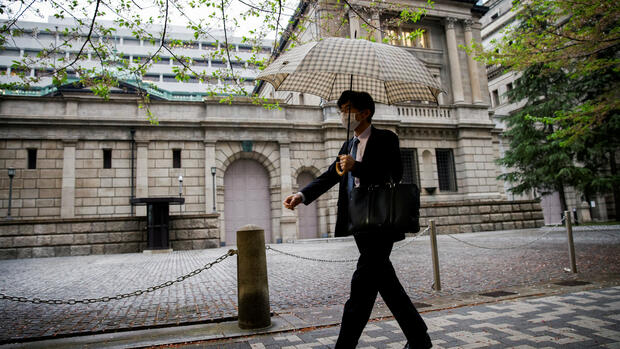Tokyo Japan’s central bank is sticking to its ultra-loose monetary policy. The Bank of Japan’s (BoJ) Monetary Policy Committee announced on Friday that it would keep interest rates at minus 0.1 percent. Contrary to the bets of some investors, the BoJ is also sticking to its yield curve control, with which it wants to let the interest rates on ten-year government bonds (JGBs) fluctuate in a corridor of plus/minus 0.5 percent around zero.
For a short time, the rate for one euro was just under 154 yen and thus higher than it had been for 15 years. Meanwhile, the Nikkei 225 stock index rose. Because a weaker yen increases the foreign profits of Japanese companies when converted into the domestic currency.
With its decision, Ueda follows the market consensus. It is true that he has initiated a review of the previous ultra-loose monetary policy. Because recently, the defense of the interest corridor for ten-year government bonds meant that the central bank had to buy even more Japanese paper. It already holds more than half of Japan’s government debt.
However, verification will take months. The central bank continues to expect a moderate economic recovery, but also sees risks from a weaker global economy. The majority of analysts and investors therefore assume that the central bank will initiate a normalization of monetary policy, for example by raising the trading corridor for long-term bonds or lifting yield curve controls. However, the big question remains when.
Why the BoJ might accept higher inflation
According to a study by experts from Bank of America, around 30 percent of the analysts expect the BoJ to move at the end of July, in the fall or even in December at the earliest.
Inflation expectations are primarily responsible for the differences. Under Ueda, the BoJ said it would “patiently continue monetary easing while remaining flexible to developments in economic activity, prices and financial conditions”. The goal remains a stable inflation target of two percent, “accompanied by wage increases”.
However, the price increase in Japan is also above the target value, albeit significantly less than in Europe. In April, prices statistically rose 3.5 percent, a high number for the Japanese, who have lived with deflation for more than two decades. However, opinions differ on the further development of prices and thus monetary policy.
In its forecasts, the central bank assumes that the rate of inflation, which has so far been driven mainly by higher import prices, will fall again in Japan. Shigeto Nagai, Japan economist at Oxford Economics, therefore believes: “The BoJ will maintain the status quo for about a year”. Because Ueda wants to check whether the inflation target can be achieved permanently.
The focus is on whether companies will pass on their high profits not only to investors in the form of higher dividends, but also to the Japanese in the form of wage increases. Real wages have stagnated for almost 30 years and are now declining with inflation. Many large corporations showed themselves generous in this year’s pay round. However, it is still unclear whether this trend will continue and wages will rise faster than prices.
No quick rate hikes
However, the experts at Bank of America say: “We do not believe that the BoJ has the leeway to wait calmly for the results of the wage negotiations in spring 2024 before beginning policy adjustments.” Because economists expect inflation to slow down lower than expected by the BoJ.
Nobody in Japan is expecting a rapid succession of interest rate hikes like in Europe or the USA. The reason is the national debt of around 260 percent of the gross domestic product, explains Tohru Sasaki from JP Morgan Chase in Tokyo. “Big rate hikes are difficult because they would increase government debt very much.” In a new era of higher global interest rates and higher inflation, Sasaki believes that the government and the BoJ will accept higher price hikes when interest rates are low.
More: The Fed’s stop-and-go policy fuels new recession fears
